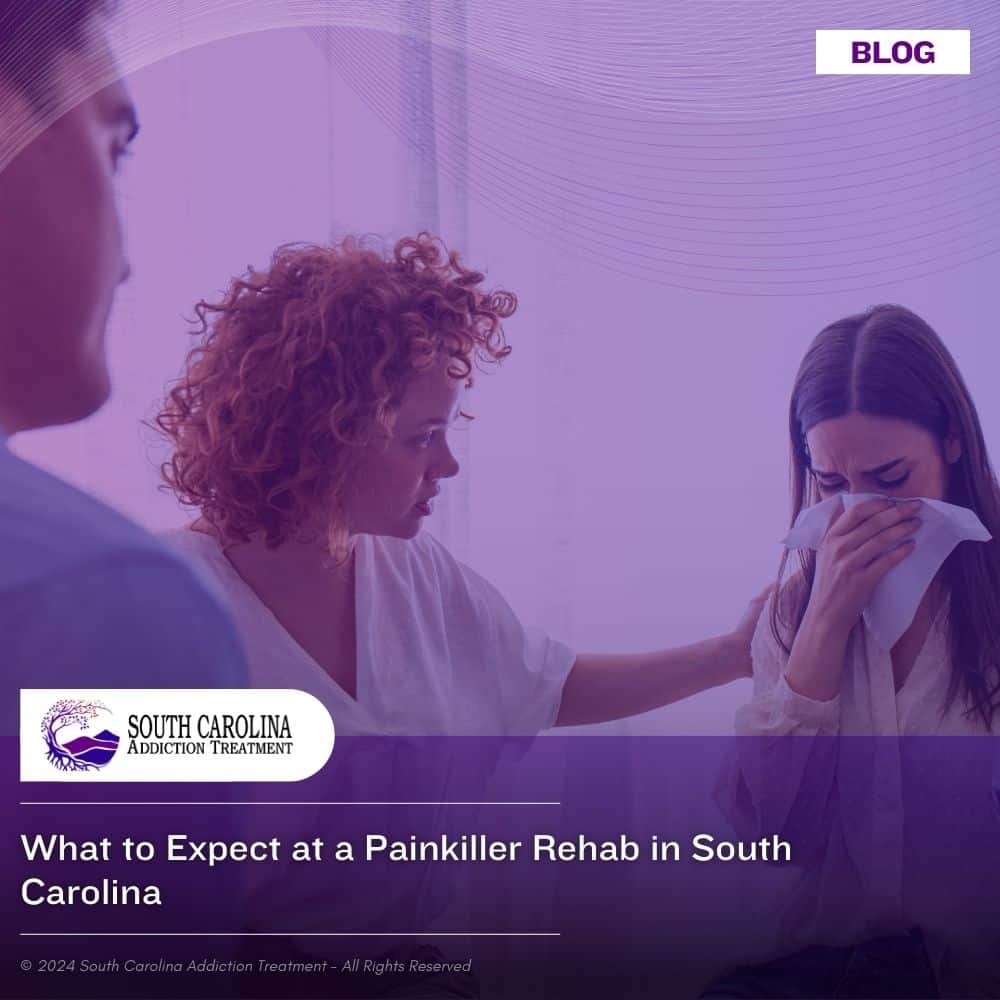What to Expect at a Painkiller Rehab in South Carolina

Medically Verified: 2/1/24
Medical Reviewer
Chief Editor

All of the information on this page has been reviewed and verified by a certified addiction professional.
If you have taken prescription painkillers before, chances are that they were opioids. Opioids are a class of drugs that depress the central nervous system and provide pain relief. Painkillers are prescription opioids that doctors give to people experiencing moderate to severe pain.
While painkillers are effective in managing pain, they can also be addictive. Painkiller addiction increases a person’s chances of experiencing a life-threatening overdose. According to the Centers for Disease Control and Prevention (CDC), “In 2021, 45 people died each day from a prescription opioid overdose, totaling nearly 17,000 deaths.”
If you are addicted to painkillers, a drug and alcohol rehab center can help. Addiction treatment programs like painkiller rehab will offer a combination of detox, medication-assisted treatment (MAT), evidence-based therapies, and relapse prevention planning. These services ensure you have the tools and support you need to achieve long-lasting sobriety.
How Does Painkiller Addiction Treatment in South Carolina Work?
Painkiller addiction is a type of substance use disorder that must be treated professionally. You will be given an individualized treatment plan that includes services that are specific to your needs. While there are various levels of care, inpatient rehab is considered more effective than outpatient treatment.
During a painkiller rehab center in South Carolina, you can expect:
Assessment
The first step in painkiller rehab is an initial assessment. The medical staff will gather information about your physical and mental health as well as your history of opioid addiction. This allows the staff members to create an individualized treatment plan.
Your treatment plan includes information like how long you should remain in the treatment facility and whether you need assistance for co-occurring mental health disorders. Additionally, they will determine whether it would be beneficial for you to transition into an outpatient program after completing your inpatient care.
Medical Detox
Drug addiction causes your body to rely on the substance to function properly. Because of this, painkiller addiction will cause withdrawal symptoms when you stop using the substance. Thankfully, painkiller rehab programs include medical detox services.
You will be given medications like methadone or Suboxone to limit withdrawal symptoms and prevent cravings. Usually, you will be tapered off of these medications until you no longer experience withdrawal symptoms. This keeps you safe, stable, and comfortable throughout the detox process.
Medication-Assisted Treatment (MAT)
Addiction has a relapse rate between 40 to 60% but relapse does not have to be a part of your story.
Medication-assisted treatment (MAT) can significantly reduce your chances of relapsing on opioid painkillers. This type of treatment involves the use of medications like Suboxone or methadone long-term. Instead of stopping them during detox, you will remain on the medication to prevent cravings from causing a relapse.
Evidence-Based Therapies
In addition to medication, you will undergo evidence-based therapies. You will participate in both individual therapy and group counseling. Your therapist will use therapies that are clinically proven to be effective in substance abuse treatment.
Examples of evidence-based therapies include:
- Cognitive behavioral therapy (CBT)
- Motivational interviewing (MI)
- Contingency management (CM)
- 12-step facilitation therapy
- Family behavior therapy
Therapy helps you address the root causes of your painkiller addiction. You will also learn vital coping mechanisms to prevent yourself from relapsing in the future.
Holistic Treatments
Holistic treatments are types of activities that promote “whole person” healing. In other words, they help you heal physically, mentally, and spiritually. For example, rehab facilities might have you participate in meditation or yoga to treat aspects of your painkiller addiction.
Commonly used holistic treatments include:
- Yoga and meditation
- Mindfulness and breathing techniques
- Art and music therapy
- Exercise and nutritional counseling
Relapse Prevention and Aftercare
Opioid relapse is common, so it’s essential to participate in relapse prevention planning. Relapse prevention involves identifying your triggers and learning how to work through them instead of returning to substance misuse.
Another vital aspect of relapse prevention is aftercare. Painkiller rehab programs in South Carolina often offer the following types of aftercare:
- Continued therapy
- Medication management for MAT
- Access to an alumni support group
- Referrals to outpatient treatment programs
- Recommendations on local support groups to attend
- Case management services like vocational assistance
Get Connected to a South Carolina Painkiller Rehab Program
If you or a loved one suffers from painkiller addiction, professional substance abuse treatment is necessary. These programs will offer you the tools and support you need to achieve long-term sobriety from opioids. At South Carolina Addiction Treatment Center, we pride ourselves on offering highly individualized and evidence-based care.
Whether you need medical detox, medication-assisted treatment, or trauma-informed care, we have your back. Our painkiller rehab center ensures every client receives the type of support they need to be successful.
Contact us today to learn more about our painkiller rehab program in South Carolina.

